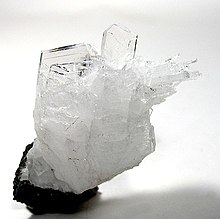Yugawaralite
| Yugawaraite | |
|---|---|
 | |
| General | |
| Category | Zeolite group |
| Formula (repeating unit) | CaAl2Si6O16 · 4H2O |
| Crystal system | Monoclinic |
| Identification | |
| Color | Colorless, pink, or white |
| Cleavage | Poor, indistinct |
| Tenacity | Very brittle |
| Mohs scale hardness | 4.5-5 |
| Luster | Vitreous, pearly |
| Streak | White |
| References | [1] |
Yugawaralite is a clear or pinkish mineral of the Zeolite group.[1][2] It was first described by Sakurai and Hayashi (1952) near a waterfall by some hot springs near Yugawara.[3]
Etymology[edit]
Yugawaralite is named after the town Yugawara, where it was found.[1]
Location[edit]
Yugawaralite is found in geothermally active areas such as Japan.[4] In Japan, yugawaralite is found on Honshu, where Yugawara is the type locality. In India, it is found in small amounts. Other locations where it has been found is Washington, Alaska, Yellowstone National Park, British Columbia, Iceland, Sardinia, and Reunion island.[2]
Alaska[edit]
In Alaska, yugawaralite is found about 40 miles (64 km) east of Fairbanks, Alaska. In this site, yugawaralite has been recorded up to 8 millimetres (0.31 in) long.[3]
Japan[edit]
In Yugawara, the crystals are found at Fudō Falls in a layer of the Neogene.[5]
References[edit]
- ^ a b c "Yugawaralite". www.mindat.org. Retrieved 2022-08-03.
- ^ a b "Yugawaralite Value, Price, and Jewelry Information". International Gem Society. Retrieved 2022-08-03.
- ^ a b Eberlein, G. Donald; Erd, R.C.; Weber, Florence; Beatty, L.B. (1971). "New Occurrence OF Yugawaralite from the Chena Hot Springs Area, Alaska" (PDF). The American Mineralogist. 56 (September–October 1971). Retrieved 5 August 2022.
- ^ "Yugawaralite" (PDF). RRUFF. Mineral Data Publishing. 2001. Retrieved 2024-01-28.
- ^ "天然記念物 - 四季彩のまち湯河原公式ホームページ". Yugawara Town (in Japanese). Retrieved 2024-01-28.
